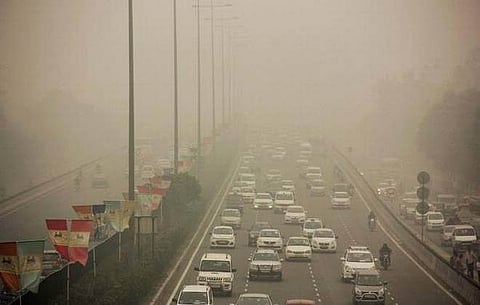
- Home
- Live Blog
- Breaking News
- Top Headlines
- Cities
- NE News
- Sentinel Media
- Sports
- Education
- Jobs

GUWAHATI: In a concerning turn of events, Guwahati has topped the global pollution charts, surpassing even Delhi, known for its severe air quality issues.
According to IQAir's 2023 World Air Quality Reports, Guwahati recorded an average annual PM2.5 concentration of 105.4, exceeding the WHO's recommended values by more than ten times.
The title of the world's most polluted city was previously held by Begusarai in Bihar. However, with Guwahati's rise to the top, Begusarai now ranks second. The top five also include Lahore, Mullanpur, and Delhi, highlighting the severe air quality challenges faced by these regions.
What is particularly alarming is that nine out of the ten most polluted cities in the world are now located in India, showcasing the scale of the air pollution crisis in the country. This trend underscores the urgent need for robust measures to tackle air pollution and protect public health.
The report underscores the grave health risks posed by air pollution, emphasizing its status as the most pressing environmental danger to human health. With approximately one in nine global deaths linked to air pollution, its harmful impacts are undeniable.
Exposure to PM2.5 air pollution worsens a range of health conditions, including asthma, cancer, stroke, and lung disease. Moreover, it can hinder cognitive development in children, heighten the risk of mental health problems, and exacerbate pre-existing illnesses like diabetes.
The reasons behind Guwahati's deteriorating air quality are multifaceted. Rapid urbanization, industrial activities, vehicular emissions, and biomass burning are some of the key contributors to the city's pollution woes. The situation is further exacerbated by geographical factors such as weather patterns and topography.
Efforts to address air pollution in Guwahati and other highly polluted cities must be intensified. This includes implementing stricter emission standards for industries and vehicles, promoting public transportation, and encouraging the adoption of cleaner fuels and technologies. Additionally, public awareness campaigns and community engagement are crucial in fostering a culture of environmental stewardship and sustainable living.
The rise of Guwahati to the top of the global pollution league serves as a stark reminder of the urgent need to prioritize environmental conservation and combat air pollution for the well-being of current and future generations.
ALSO WATCH: